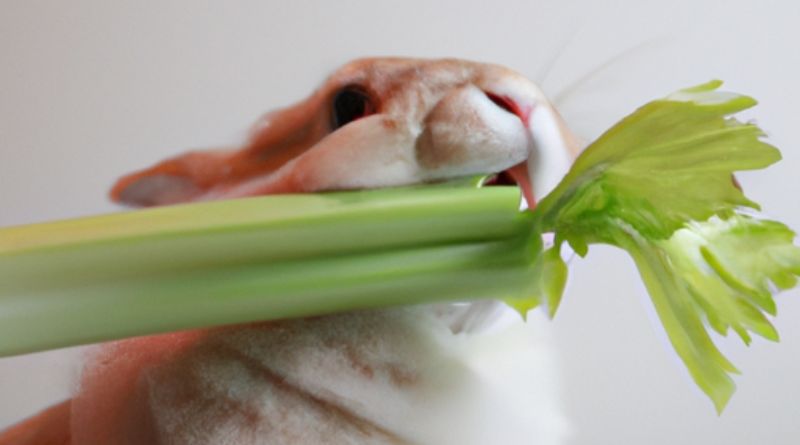Bunnies, or domestic rabbits, are beloved pets known for their playful personalities, adorable antics, and unique dietary needs. As herbivores, rabbits thrive on a diet consisting primarily of hay, fresh vegetables, and some fruits. But when it comes to specific vegetables, like celery, pet owners often wonder, “Can a bunny eat celery?”
The answer is yes, bunnies can eat celery, but there are important considerations to keep in mind to ensure it’s provided safely and in the right quantities. Celery can offer a healthy snack or supplement to your rabbit’s regular diet, but it is essential to understand how much celery is appropriate, how to serve it, and any potential risks associated with feeding it to your rabbit.
In this article, we’ll explore the nutritional benefits of celery for rabbits, how to properly introduce it into their diet, and answer some frequently asked questions about bunnies and celery.
Table of Contents
Nutritional Benefits of Celery for Bunnies
Celery is a low-calorie, high-water vegetable that can offer a variety of benefits to your rabbit’s diet. Here’s a look at the key nutritional components of celery and how they contribute to a rabbit’s health:
1. Hydration
Celery is made up of about 95% water, which can help keep your bunny hydrated, especially during warmer months. Hydration is crucial for rabbits, as it supports digestion, circulation, and overall health.
2. Fiber
Celery is a good source of dietary fiber, which is essential for a rabbit’s digestive system. Fiber helps keep the digestive tract moving and ensures that food passes through efficiently. It also plays a role in preventing gastrointestinal issues, such as bloating or constipation, which are common concerns for rabbits.
3. Vitamins and Minerals
Celery contains small amounts of essential vitamins and minerals that can support your rabbit’s overall health. Some of the key nutrients found in celery include:
- Vitamin A: Important for vision and immune function.
- Vitamin K: Supports bone health and blood clotting.
- Potassium: Helps maintain healthy muscle function and regulates fluids.
- Folate: Aids in cell growth and development, especially important for young bunnies.
4. Low in Sugar
Unlike some fruits and other vegetables, celery is low in sugar, making it an ideal option for rabbits who may be prone to obesity or digestive issues caused by high sugar intake. This makes celery a better choice than more sugary vegetables like carrots, especially if you’re trying to maintain a balanced diet for your rabbit.
How to Safely Feed Celery to Your Bunny
While celery can be a healthy and hydrating treat for your bunny, there are a few important guidelines to follow when introducing this vegetable into their diet:
1. Start with Small Amounts
If you’ve never fed your bunny celery before, start by offering a small amount and observing how they react. Some rabbits may be more sensitive to new foods, and introducing a variety of vegetables too quickly can cause digestive upset. Begin by giving your bunny a small stalk of celery and gradually increase the portion over time if there are no signs of digestive issues.
2. Wash Thoroughly
Celery, like all vegetables, should be washed thoroughly to remove any pesticides, dirt, or chemicals. Even if the celery is labeled “organic,” it’s still a good idea to rinse it under cool running water to ensure it’s clean and safe for your rabbit.
3. Remove the Leaves
While the stalks of celery are generally safe for rabbits, the leaves should be avoided. Celery leaves contain higher levels of oxalates, which can be harmful to rabbits in large quantities. In addition, they may cause digestive upset or kidney problems if consumed frequently. Stick to feeding your bunny just the celery stalks.
4. Cut into Small Pieces
Celery stalks can be tough for some rabbits to chew, especially if they are younger or have dental issues. To make it easier for your bunny to eat and digest, cut the celery into small, manageable pieces. This will also reduce the risk of choking.
5. Moderation is Key
As with any treat or new food, moderation is important. Celery should never make up more than 10% of your rabbit’s total diet. The bulk of their food should come from hay (the main source of fiber) and fresh leafy greens (like romaine lettuce, cilantro, and parsley), with small portions of vegetables and fruits as treats.
6. Observe for Any Digestive Issues
When introducing new foods to your bunny’s diet, always observe for any signs of digestive discomfort. Common signs of digestive upset include diarrhea, bloating, or a lack of appetite. If any of these symptoms occur, stop feeding celery immediately and consult a veterinarian if the symptoms persist.
Potential Risks of Feeding Celery to Bunnies
Although celery is a generally safe vegetable for rabbits, there are some potential risks to keep in mind:
1. High Water Content
While the high water content in celery can help keep your bunny hydrated, it can also lead to diarrhea or loose stools if fed in excess. This is especially true if celery is introduced too quickly or in large quantities. Always remember that variety is key in your rabbit’s diet, and overfeeding any one food can cause imbalances.
2. Pesticides and Chemicals
Celery is often grown with pesticides or herbicides, which can be harmful to rabbits. To minimize this risk, always buy organic celery when possible, or make sure to wash conventionally grown celery thoroughly before feeding it to your pet.
3. Oxalates in Celery Leaves
As mentioned earlier, celery leaves contain higher levels of oxalates, which can contribute to kidney problems and bladder stones if consumed in large quantities over time. For this reason, always ensure that your bunny only eats the stalks of celery and avoids the leaves.
4. Choking Hazard
Although celery is a nutritious treat, the fibrous texture of the stalks can pose a choking hazard, especially if the celery is cut into large chunks. To reduce the risk, always chop the celery into smaller pieces that your bunny can easily chew and swallow.
FAQs About Rabbits Eating Celery
1. Can baby rabbits eat celery?
It’s best to avoid feeding celery to baby rabbits (under 12 weeks old). Baby rabbits have more sensitive digestive systems, and their main food source should be hay, water, and a limited amount of fresh greens. You can start introducing small amounts of celery when they reach 12 weeks or older, as long as they are eating solid food and are ready for new vegetables.
2. How much celery can I give my rabbit?
Celery should be offered as an occasional treat, making up no more than 10% of your bunny’s overall diet. A small stalk or a few pieces of celery a couple of times a week is more than enough to provide the benefits of hydration and fiber without overwhelming their digestive system.
3. Can celery help with my rabbit’s digestion?
Yes, the fiber in celery can help support healthy digestion in rabbits by promoting regular bowel movements. However, it’s important to provide a balanced diet that includes a variety of hay and vegetables to maintain proper digestive health.
4. Is celery good for overweight rabbits?
Yes, celery is a great choice for overweight rabbits because it is low in calories and high in water content. It provides a crunchy, satisfying snack without adding excessive calories or sugar, which can contribute to weight gain.
5. Can I feed celery to my rabbit every day?
While celery is a healthy vegetable for rabbits, it’s best to offer it in moderation and rotate it with other vegetables to ensure a balanced diet. Offering celery every day might lead to an unbalanced diet and digestive issues, so try to keep it as an occasional treat along with a variety of other fresh greens and vegetables.
Conclusion
In summary, bunnies can safely eat celery, and it can provide hydration, fiber, and some essential nutrients. However, like any treat, it should be fed in moderation and with attention to proper preparation. Always remove the leaves, wash the celery thoroughly, and cut it into manageable pieces to prevent choking or digestive upset. Remember that variety is key to a healthy rabbit diet, and celery should be just one of many fresh vegetables you offer your bunny. By following these guidelines, you can ensure that celery is a safe and enjoyable addition to your rabbit’s diet.



